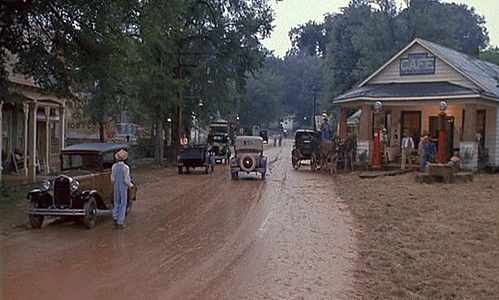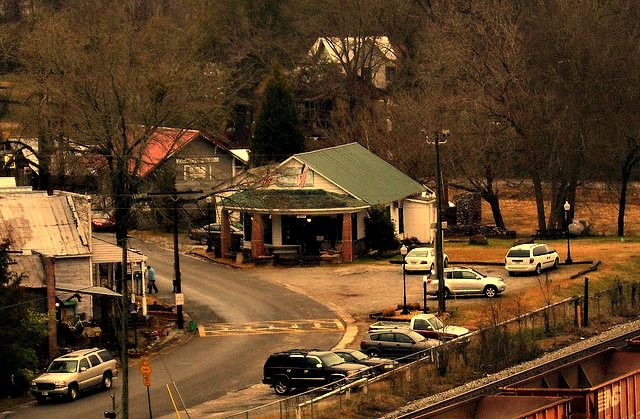
Among the many powerful images in Fried Green Tomatoes (1991), none is more central than the Whistle Stop Café.
More than just a setting, the café acts as a symbol of sanctuary, resistance, and community throughout the story — standing quietly at the crossroads between tradition and rebellion, pain and healing.
By examining the Whistle Stop Café closely, we uncover the emotional architecture that holds the entire film together.
Origins: A Café Born from Friendship
The Whistle Stop Café is founded when Idgie Threadgoode and Ruth Jamison return to Whistle Stop after rescuing Ruth from her abusive marriage.
With financial help from Idgie’s family and the hands-on involvement of locals like Sipsey and Big George, they transform an abandoned building near the railroad tracks into a thriving hub of life.
The founding of the café is an act of defiance:
-
Against societal expectations (women, especially unmarried ones, weren’t “supposed” to run businesses).
-
Against gender roles, race barriers, and even the rigid class divisions of the Deep South during the 1920s and 1930s.
A Symbol of Inclusion and Equality
Inside the café, the rules of the outside world dissolve:
-
Black and white patrons sit together, eat together, and are treated with equal respect — an unthinkable arrangement in the Jim Crow South.
-
Travelers, hobos, the poor are fed whether they can pay or not.
-
Women and men interact as equals, with Idgie often challenging traditional masculine roles by her mere presence and attitude.
Even without shouting slogans or giving political speeches, the café practices a quiet, radical equality.
It offers a vision of a better world — not by overturning the old one in anger, but by simply living differently.

A Place of Protection
The Whistle Stop Café is more than friendly — it’s a fortress of emotional safety:
-
Ruth finds refuge there, raising her son, Buddy Jr., away from Frank Bennett’s abuse.
-
Big George and Sipsey find stable employment and dignity, despite the outside world’s racist structures.
-
Idgie herself thrives, living authentically without having to fit into conventional notions of femininity.
When dangers arise — from abusive husbands to law enforcement scrutiny — the café shields its people, sometimes even bending the law (as in the aftermath of Frank’s death) to ensure their survival.
In this way, the café embodies the idea of community justice — taking care of its own when formal institutions fail.
Food as Love, Food as Resistance
Food is central to the café’s operation — but in Fried Green Tomatoes, food is never just food:
-
It represents love: Meals are cooked with care, served with kindness, and shared with everyone.
-
It represents memory: Recipes are handed down, and dishes recall childhoods, lost families, and old friendships.
-
It represents survival: In a world full of hunger — physical and emotional — the café nourishes in every sense.
And in the film’s darkest, most ironic twist, food also becomes a tool of protection. After Frank Bennett’s death, hints suggest that his remains are secretly cooked and served in barbecue.
This morbid joke — “the secret’s in the sauce” — is not played for cruelty but to underscore the idea that justice and survival sometimes demand creativity in desperate times.
Thus, even in its most chilling moment, the Whistle Stop Café remains a place of community defense.
The Café’s Decline Mirrors Social Changes
As the decades pass, the café eventually closes — a victim of economic shifts, the decline of small towns, and the rise of highways that pull travelers away from places like Whistle Stop.
By the time Evelyn and Ninny are reminiscing in the 1980s, Whistle Stop itself is a ghost town.
The café’s abandonment mirrors the broader loss of community connection in American life — a bittersweet commentary on progress and nostalgia.
Yet through Ninny’s stories and Evelyn’s transformation, the café’s spirit lives on, reminding audiences that acts of kindness, courage, and solidarity leave a legacy even when physical places disappear.
The Beating Heart of Whistle Stop
The Whistle Stop Café is not just where the characters eat — it’s where they heal, grow, protect each other, and resist a world that would otherwise crush them.
In a film filled with laughter, pain, memory, and hope, the café stands as a silent but powerful character of its own:
-
A shelter in the storm.
-
A dream of a better, more compassionate society.
-
A testimony that ordinary people, working together, can build something extraordinary — one meal, one act of kindness, one stubborn refusal to give up at a time.
At its heart, Fried Green Tomatoes reminds us:
Sometimes the simplest things — a plate of food, a kind word, a safe place to sit — are what change lives forever.
